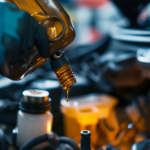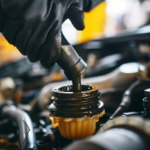Are your alloy wheels looking dull and dirty? Learn how to clean and maintain them in just a few simple steps. Regular cleaning is essential to keep your wheels looking their best and to prevent damage. With the right supplies and a little elbow grease, you can remove brake dust and stubborn stains, polish the surfaces, and protect them from future damage. Follow these tips to keep your alloy wheels shining like new.
Understanding the Importance of Regular Cleaning
You should regularly clean your alloy wheels to ensure optimal performance and appearance. Alloy wheels are not only a stylish addition to your vehicle, but they also play a crucial role in its overall performance. Over time, dirt, brake dust, and other contaminants can accumulate on the surface of your wheels, affecting their ability to function properly. By cleaning your alloy wheels regularly, you can remove these build-ups and prevent any potential damage or corrosion. Additionally, regular cleaning helps to maintain the shiny and polished appearance of your wheels, enhancing the overall look of your vehicle. Neglecting to clean your alloy wheels can lead to decreased performance, reduced fuel efficiency, and an unsightly appearance. So, make it a habit to give your wheels some TLC and enjoy a smoother ride and a stylish vehicle.
Gathering the Necessary Supplies
To effectively clean and maintain your alloy wheels, you will need a few essential cleaning tools. These include a non-abrasive wheel cleaner, a soft-bristled brush or sponge, and a microfiber towel. It is important to gather these supplies before you begin the cleaning process in order to achieve the best results and protect your wheels from damage.
Essential Cleaning Tools
Gather all the necessary supplies for cleaning and maintaining alloy wheels. To effectively clean your alloy wheels, you will need a few essential cleaning tools. Start by grabbing a bucket to mix your cleaning solution. You will also need a soft-bristled brush or sponge to scrub away dirt and grime. An old toothbrush can be useful for reaching tight spots. Additionally, make sure to have a microfiber cloth or towel on hand to dry and polish the wheels. To protect your hands, wear a pair of gloves. Lastly, you will need a wheel cleaner specifically formulated for alloy wheels. It’s important to choose a cleaner that is safe and effective. Once you have gathered all these tools, you will be well-equipped to clean and maintain your alloy wheels.
Proper Cleaning Technique
Firstly, make sure you have already gathered all the necessary supplies for properly cleaning and maintaining your alloy wheels. To clean your alloy wheels effectively, you will need a few specific items. Start by getting a bucket, a non-acidic wheel cleaner, a soft-bristle brush, a microfiber towel, and a hose with a spray nozzle. The bucket will be used to mix the wheel cleaner with water. Make sure to choose a non-acidic wheel cleaner to prevent any damage to the wheels. The soft-bristle brush will help you scrub away dirt and grime, while the microfiber towel will be used for drying and polishing. Lastly, the hose with a spray nozzle will provide a strong stream of water for rinsing off the cleaning solution. With all these supplies ready, you are now prepared to clean your alloy wheels effectively.
Preparing the Wheels for Cleaning
Before you begin cleaning your alloy wheels, make sure to gather all the necessary supplies. Having everything ready will make the cleaning process smoother and more efficient. First, you will need a bucket filled with warm water and a mild detergent specifically designed for cleaning alloy wheels. Avoid using harsh chemicals or abrasive cleaners as they can damage the finish. Additionally, gather a soft bristle brush, a microfiber cloth, and a hose or pressure washer for rinsing. It’s also a good idea to have a wheel cleaner or tar remover on hand for any stubborn stains or contaminants. Lastly, make sure to have a wheel sealant or wax for protecting the wheels after cleaning. Once you have all the supplies, you’re ready to move on to the next step: removing any loose debris from the wheels.
Removing Brake Dust and Stubborn Stains
Once you’ve gathered all the necessary supplies, now it’s time to tackle the task of removing brake dust and stubborn stains from your alloy wheels. To begin, make sure your wheels are cool to the touch. Spray a wheel cleaner specifically designed for alloy wheels onto the surface of each wheel. Allow the cleaner to sit for a few minutes to penetrate and loosen the brake dust and stains. Then, using a soft-bristle brush or a wheel brush, scrub the surface of each wheel in a circular motion. Pay extra attention to areas with heavy build-up of brake dust. Rinse the wheels thoroughly with water to remove all the cleaner and debris. Finally, dry the wheels with a microfiber cloth to prevent water spots and give them a shiny finish.
Cleaning the Wheel Surfaces
To effectively clean your alloy wheels, you will need to use a combination of a wheel cleaner and a soft-bristle brush. Cleaning the wheel surfaces is an essential part of maintaining the appearance and performance of your alloy wheels. Start by spraying the wheel cleaner onto the surface of the wheel, ensuring that it reaches all areas, including the spokes and crevices. Allow the cleaner to sit for a few minutes to break down any dirt and grime. Then, use a soft-bristle brush to scrub the wheel surfaces gently. Be sure to pay attention to any stubborn stains or hard-to-reach areas. Rinse the wheels thoroughly with water to remove all the cleaner and dirt. Finally, dry the wheels with a clean microfiber cloth to prevent any water spots or streaks. Regularly cleaning the wheel surfaces will help keep your alloy wheels looking shiny and new.
Polishing and Protecting the Alloy Wheels
To maintain the shine and durability of your alloy wheels, you should regularly polish and protect them. Polishing your alloy wheels not only enhances their appearance but also helps to remove any stubborn stains or dirt that may have accumulated over time. Use a specialized alloy wheel polish and a soft cloth to gently buff the surface of the wheels, paying attention to any areas that require extra attention. Once you have polished the wheels, it is important to protect them to prevent future damage. Apply a layer of wheel wax or sealant to create a barrier against elements such as brake dust, road grime, and corrosive chemicals. This will help to keep your alloy wheels looking shiny and new for longer periods of time. Remember to reapply the polish and protection regularly to maintain the best results.
Maintaining the Shine and Preventing Future Damage
To maintain the shine of your alloy wheels and prevent future damage, it is important to establish a regular cleaning routine. This includes washing your wheels with mild soap and water, and using a soft brush or sponge to remove dirt and grime. Additionally, applying a protective coating can help to prevent oxidation and corrosion. Avoid using harsh cleaning methods or abrasive cleaners, as these can scratch the surface of your wheels and compromise their shine.
Regular Cleaning Routine
Keep your alloy wheels looking shiny and prevent future damage by following a regular cleaning routine. Start by rinsing your wheels with water to remove any loose dirt and debris. Then, use a specialized wheel cleaner and a soft brush to gently scrub the surface of the wheels. Be sure to pay extra attention to any brake dust or grime buildup. After scrubbing, rinse the wheels thoroughly with water to remove all the cleaner. Next, dry the wheels with a clean microfiber cloth to prevent water spots. To maintain the shine, apply a wheel wax or sealant to protect the surface from road grime and brake dust. Finally, repeat this cleaning routine regularly to keep your alloy wheels looking their best.
Protective Coating Application
Apply a high-quality protective coating to maintain the shine and prevent future damage to your alloy wheels. This step is crucial in keeping your wheels looking their best for longer. The protective coating acts as a barrier, shielding your wheels from dirt, road grime, brake dust, and other contaminants that can cause damage over time. Before applying the coating, ensure that your wheels are clean and dry. Use a microfiber cloth or foam applicator pad to evenly apply the coating, making sure to cover the entire surface of each wheel. Allow the coating to dry completely before driving your vehicle. Remember to reapply the protective coating every few months or as recommended by the manufacturer to ensure continued protection and a lasting shine.
Avoid Harsh Cleaning Methods
Don’t use harsh cleaning methods that could damage your alloy wheels and diminish their shine. When it comes to maintaining the shine and preventing future damage, it’s important to be gentle with your wheels. Avoid using abrasive cleaners or harsh chemicals that can strip away the protective coating and leave your wheels vulnerable to corrosion. Instead, opt for a mild soap and water solution or a specialized alloy wheel cleaner. Use a soft-bristled brush or sponge to gently scrub away dirt and grime, making sure to reach all the nooks and crannies. Rinse thoroughly with clean water and dry with a microfiber cloth to prevent water spots. By avoiding harsh cleaning methods, you can keep your alloy wheels looking shiny and new for longer.
Troubleshooting Common Cleaning Issues
Are you experiencing difficulty removing stubborn brake dust from your alloy wheels? Don’t worry, you’re not alone. Many alloy wheel owners face this common cleaning issue. One possible solution is to use a specialized alloy wheel cleaner. These cleaners are formulated to break down brake dust and road grime, making it easier to remove. Simply spray the cleaner onto the wheels, let it sit for a few minutes, and then use a soft bristle brush to scrub away the stubborn dirt. Rinse off the cleaner with water and dry the wheels thoroughly. If the brake dust is still not coming off, you may need to try a more abrasive cleaner or seek professional help. Remember to always follow the manufacturer’s instructions and avoid using harsh chemicals that could damage your alloy wheels.

Lucas is an experienced vehicle technician with hands-on knowledge of almost every car brand available. Throughout his career, Lucas has worked on a wide range of vehicles, including domestic and foreign models, sports cars, trucks, and SUVs.





